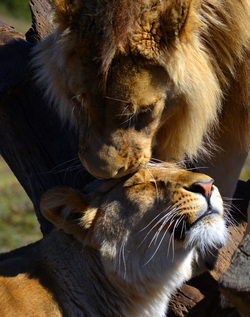
Whether it is the senseless destruction by rich white men (hunting) or by poor blacks (bushmeat and poaching) or by Asian syndicates (poaching) the result is the same – devastation of biological diversity and dreadful animal suffering on a global scale.
We have forgotten that conservation means “the preservation of natural functioning eco-systems”. Nowadays every hunter calls himself a conservationist – because he is only killing some animals not all of them.
We need a philosophy that gets back to true conservation. However idealistic and aspirational it may be, it is better than adopting a licence to kill as an overarching philosophy.
To preserve biodiversity, we need discipline and rigid protection. One example of this is the island of Santo Domingo. A clear line can be seen running down the border that divides Haiti from the Dominican Republic. On the Haiti side, no trees, no life, just utter environmental ruin. On the Dominican side, some rich natural forests still survive. Why? Because right from the start, the Dominicans adopted a zero tolerance approach to Haitian poachers and woodcutters. The army was deployed to shoot trespassers on sight.
This hard line did not result in substantial loss of human life. Once a dozen or so Haitians had been killed, the message got home, and Haitians stopped coming over the border to poach. The results can be seen today, and right there is the lesson.
Most African governments lack the political will to preserve their natural functioning eco-systems. Even if they had the will, they lack the money, the capacity and the technology to protect their heritage. Right now, Africa is heading steadily in the direction of becoming a continental Haiti – a self-defeating cesspit of poverty, misery and environmental degradation. What is needed is rather for Africa to aim at becoming a continental Dominican Republic.
Yes, involving local tribesman is important. Yes, every effort must be made to divert funds from eco-tourism to local communities so that they feel that they have a stake in the preservation of biodiversity. But along with the carrot must come the stick. Experience has shown that benefits alone are inadequate. Nature reserves need also to be rigidly protected with the most effective modern technology and with military ruthlessness.
That needs the support of the developed world. That should not be too hard to get.
However, rigid protection of biodiversity also requires African governments to pursue unpopular policies that will inevitably alienate some sections of their voting constituencies. Based on experience to date, this is most unlikely to happen, if not inconceivable.
There are examples where indigenous people have organised resistance to exploitation of natural resources, such as is happening right now in Amazonia, but this pits them against their own governments and they must needs fight against the national army.
I am not aware of any such grassroots resistance among indigenous tribes of Southern Africa.
